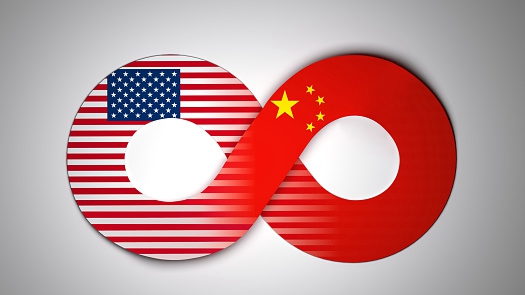
Editor's note: Alessandro Golombiewski Teixeira is a National Thousand Talent Distinguished Professor of Public Policy at the School of Public Policy and Management, Tsinghua University, and a professor of International Business at Schwarzman College in Tsinghua. He is a former special economic advisor to the president of Brazil and former minister of tourism, and minister of development, industry and foreign trade of Brazil. He was also president of the World Investment Association – WAIPA. The article reflects the author's views, not necessarily those of CGTN.
If you flick through a few online articles portraying relations between China and the U.S. today, chances are you would encounter phrases like "colossal dangers," "engulfing the world" and even a "new Cold War." Commentators are increasingly using escalatory language to depict the bilateral relationship.
Since the first high-level U.S.-China meeting, hopes for a turnaround on U.S. foreign policy toward China – toward competition instead of confrontation – have fallen flat. In its place, Biden has doubled down on former President Donald Trump's script for China. Coming out of his first 100 days as U.S. president, Biden's tough stance is closer to Trump's than many expected. This, along with his lack of interest in engaging with China on key issues, is serving to stoke frictions with China.
At the core of friction is the U.S.'s perceived identity as the world's creative hub, home of justice and free society with the world's strongest democracy. The U.S. economic stimulus bill approved by the Senate this year aims to shore up economy to pedal this very idea and counter China's global influence.
However, one recent article from The Week comments that "Cold War 2.0" between China and the U.S. is not inevitable and "China is not known for its ideological zeal to convert the world to communism."
It is true that China's development doesn't dictate the country's shift away from its domestic situation to the international stage. U.S. leaders must realign their flawed theories about China's growth with the reality of what China's socialist market economy means today – a dynamic, innovative economy. Below are four key arguments that explain why the "Cold War" term is both unhelpful and wrong:
Avoiding confrontation
The concept of a "Cold War" was coined by English writer George Orwell in 1945, predicting decades of nuclear hostility between the U.S. and Soviet Union. At a broader level, the term refers to a conflict between opposing nations pursued by covert means instead of direct military conflict. The U.S.-China dynamic falls short in this regard, as China both at present and in the future actively seeks to avoid confrontation.
Instead, emphasis is placed on political diplomacy, healthy economic competition and a positive accommodating relationship. Chinese leaders understand their history as an evolutionary process seeking to rejuvenate Chinese civilization, far from any notion of impulsively taking control of all global affairs with China at the head.
Where are China's expansionist ambitions?
Second, China doesn't have expansionist ambitions. China's history offers an insight into its leaders' perceptions surrounding expansionism. For centuries, China has been the single strongest civilization in Asia. While the Portuguese and Spanish began to carve up the word in the 15th century, the Chinese navy commanded by navigator Zheng had already ventured across Eurasia, Africa and Middle East without engaging in any conquest or war.
China also diverges with the U.S. in that its leaders do not believe it is their role or mission to promote Chinese civilization or even encourage humanity to take up their values or ideas. China's political leadership won't use their influence to transform ideologies or political practices around the globe, fundamentally because they do not believe society should become like them.

Customers watch a speech by Joe Biden on a television during an election watching event at a local bar in Beijing, China, November 4, 2020. /Getty
Customers watch a speech by Joe Biden on a television during an election watching event at a local bar in Beijing, China, November 4, 2020. /Getty
Strategic cooperation not rivalry – cooperate to compete
It goes without saying today's globalized world has come a long way from the world of the U.S.-Soviet Cold War. Following the Soviet Union's collapse in 1991, the Cold War came to an end and the United States hegemony was elevated to new levels on the world stage. For more than 30 years, the U.S. economy had no other country to compare itself with in pure economic terms.
China has since become the world's largest economy (in terms of purchasing power parity), manufacturer and holder of foreign exchange reserves. China is the largest commercial partner of the United States. China's economic prowess and entanglement with the U.S. economy is clearly far from that of the Soviet Union's during the Cold War period.
Today, both the U.S. and China cannot afford to decouple, especially considering the weakened U.S. economy coming out of the pandemic. On the other hand, China was the only major economy to register growth in 2020, in turn helping the recovery of many other economies. Instead of endorsing a protracted rivalry, the U.S. should learn to cooperate to compete in health and other areas, as one would expect from a flag-bearer of the "market economy."
Societal values and the confrontation of U.S. dualism
In the U.S., citizens are educated in terms of "dualism" – always in terms of polar opposites. This entails perceiving issues as black or white, right or wrong, good or bad. Chinese culture, on the other hand, teaches the viewing of issues in a more holistic sense. Social needs and harmony are seen as more important than individual needs and rights, and the prevention of disasters or chaos is the main purpose of governance.
In this way, Chinese culture doesn't believe in enforcing their worldview, and rather believes that each nation needs to find its own evolutionary path. This goes some way to explain the goal of Chinese leaders to develop their own model of "socialism with Chinese characteristics." As China's former leader Deng Xiaoping once said, "Seek truth from facts."
For these key reasons, labeling the relationship between today's leading economies "Cold War 2.0" misses the mark. Such a notion clashes with the Chinese outlook, society and even the very nature of its government. Only though cross-cultural dialogue, understanding and cooperation can the two powers shake off any redundant comparisons.
(If you want to contribute and have specific expertise, please contact us at opinions@cgtn.com.)

